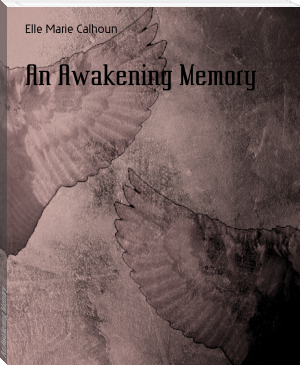Apocalypse - Ellen G. White (good book club books txt) 📗

- Author: Ellen G. White
Book online «Apocalypse - Ellen G. White (good book club books txt) 📗». Author Ellen G. White
If God's professed people would receive the light as it shines upon them from His word, they would reach that unity for which Christ prayed, that which the apostle describes, "the unity of the Spirit in the bond of peace." "There is," he says, " one body, and one Spirit, even as ye are called in one hope of your calling; one Lord, one faith, one baptism." Ephesians 4:3-5. Such were the blessed results experienced by those who accepted the advent message. They came from different denominations, and their denominational barriers were hurled to the ground; conflicting creeds were shivered to atoms; the unscriptural hope of a temporal millennium was abandoned, false views of the second advent were corrected, pride and conformity to the world were swept away; wrongs were made right; hearts were united in the sweetest fellowship, and love and joy reigned supreme. If this doctrine did this for the few who did receive it, it would have done the same for all if all had received it.
But the churches generally did not accept the warning. Their ministers, who, as watchmen "unto the house of Israel," should have been the first to discern the tokens of Jesus' coming, had failed to learn the truth either from the testimony of the prophets or from the signs of the times. As worldly hopes and ambitions filled the heart, love for God and faith in His word had grown cold; and when the advent doctrine was presented, it only aroused their prejudice and unbelief. The fact that the message was, to a great extent, preached by laymen, was urged as an instrument against it. As of old, the plain testimony of God's word was met with the inquiry: "Have any of the rulers or of the Pharisees believed?" And finding how difficult a task it was to refute the arguments drawn from the prophetic periods, many discouraged the study of the prophecies, teaching that the prophetic books were sealed and were not to be understood. Multitudes, trusting implicitly to their pastors, refused to listen to the warning; and others, though convinced of the truth, dared not confess it, lest they should be "put out of the synagogue." The message which God had sent for the testing and purification of the church revealed all too surely how great was the number who had set their affections on this world rather than upon Christ. The ties which bound them to earth were stronger than the attractions heavenward. They chose to listen to the voice of worldly wisdom and turned away from the heart-searching message of truth.
In refusing the warning of the first angel, they rejected the means which Heaven had provided for their restoration. They spurned the gracious messenger that would have corrected the evils which separated them from God, and with greater eagerness they turned to seek the friendship of the world. Here was the cause of that fearful condition of worldliness, backsliding, and spiritual death which existed in the churches in 1844. In Revelation 14 the first angel is followed by a second proclaiming: "Babylon is fallen, is fallen, that great city, because she made all nations drink of the wine of the wrath of her fornication." Revelation 14:8. The term "Babylon" is derived from "Babel," and signifies confusion. It is employed in Scripture to designate the various forms of false or apostate religion. In Revelation 17 Babylon is represented as a woman --a figure which is used in the Bible as the symbol of a church, a virtuous woman representing a pure church, a vile woman an apostate church.
In the Bible the sacred and enduring character of the relation that exists between Christ and His church is represented by the union of marriage. The Lord has joined His people to Himself by a solemn covenant, He promising to be their God, and they pledging themselves to be His and His alone. He declares: "I will betroth thee unto Me forever; yea, I will betroth thee unto Me in righteousness, and in judgment, and in loving-kindness, and in mercies." Hosea 2:19. And, again: "I am married unto you." Jeremiah 3:14. And Paul employs the same figure in the New Testament when he says: "I have espoused you to one husband, that I may present you as a chaste virgin to Christ." 2 Corinthians 11:2.
The unfaithfulness of the church to Christ in permitting her confidence and affection to be turned from Him, and allowing the love of worldly things to occupy the soul, is likened to the violation of the marriage vow. The sin of Israel in departing from the Lord is presented under this figure; and the wonderful love of God which they thus despised is touchingly portrayed: "I sware unto thee, and entered into a covenant with thee, saith the Lord God, and thou becamest Mine." "And thou wast exceeding beautiful and thou didst prosper into a kingdom. And thy renown went forth among the heathen for thy beauty: for it was perfect through My comeliness, which I had put upon thee. . . . But thou didst trust in thine own beauty, and playedst the harlot because of thy renown." "As a wife treacherously departeth from her husband, so have ye dealt treacherously with Me, O house of Israel, saith the Lord;" "as a wife that committeth adultery, which taketh strangers instead of her husband!" Ezekiel 16:8, 13-15, 32; Jeremiah 3:20.
In the New Testament, language very similar is addressed to professed Christians who seek the friendship of the world above the favour of God. Says the apostle James: "Ye adulterers and adulteresses, know ye not that the friendship of the world is enmity with God? whosoever therefore will be a friend of the world is the enemy of God." The woman (Babylon) of Revelation 17 is described as "arrayed in purple and scarlet colour, and decked with gold and precious stones and pearls, having a golden cup in her hand full of abominations and filthiness:...and upon her forehead was a name written, Mystery, Babylon the Great, the mother of harlots."
Says the prophet: "I saw the woman drunk with the blood of the saints, and with the blood of the martyrs of Jesus." Babylon is further declared to be "that great city, which reigneth over the kings of the earth." Revelation 17:4-6, 18. The power that for so many centuries maintained despotic sway over the monarchs of Christendom is Rome. The purple and scarlet colour, the gold and precious stones and pearls, vividly picture the magnificence and more than kingly pomp affected by the haughty see of Rome. And no other power could be so truly declared "drunken with the blood of the saints" as that church which has so cruelly persecuted the followers of Christ. Babylon is also charged with the sin of unlawful connection with "the kings of the earth." It was by departure from the Lord, and alliance with the heathen, that the Jewish church became a harlot; and Rome, corrupting herself in like manner by seeking the support of worldly powers, receives a like condemnation.
Babylon is said to be "the mother of harlots." By her daughters must be symbolized churches that cling to her doctrines and traditions, and follow her example of sacrificing the truth and the approval of God, in order to form an unlawful alliance with the world. The message of Revelation 14, announcing the fall of Babylon must apply to religious bodies that were once pure and have become corrupt. Since this message follows the warning of the judgment, it must be given in the last days; therefore it cannot refer to the Roman Church alone, for that church has been in a fallen condition for many centuries. Furthermore, in the eighteenth chapter of the Revelation the people of God are called upon to come out of Babylon. According to this scripture, many of God's people must still be in Babylon.
And in what religious bodies are the greater part of the followers of Christ now to be found? Without doubt, in the various churches professing the Protestant faith. At the time of their rise these churches took a noble stand for God and the truth, and His blessing was with them. Even the unbelieving world was constrained to acknowledge the beneficent results that followed an acceptance of the principles of the gospel. In the words of the prophet to Israel: "Thy renown went forth among the heathen for thy beauty: for it was perfect through My comeliness, which I had put upon thee, saith the Lord God." But they fell by the same desire which was the curse and ruin of Israel--the desire of imitating the practices and courting the friendship of the ungodly. "Thou didst trust in thine own beauty, and playedst the harlot because of thy renown." Ezekiel 16:14, 15.
Many of the Protestant churches are following Rome's example of iniquitous connection with "the kings of the earth"--the state churches, by their relation to secular governments; and other denominations, by seeking the favour of the world. And the term "Babylon"--confusion--may be appropriately applied to these bodies, all professing to derive their doctrines from the Bible, yet divided into almost innumerable sects, with widely conflicting creeds and theories.
Besides a sinful union with the world, the churches that separated from Rome present other of her characteristics. A Roman Catholic work argues that "if the Church of Rome were ever guilty of idolatry in relation to the saints, her daughter, the Church of England, stands guilty of the same, which has ten churches dedicated to Mary for one dedicated to Christ."--Richard Challoner, The Catholic Christian Instructed, Preface, pages 21, 22. And Dr. Hopkins, in "A Treatise on the Millennium," declares: "There is no reason to consider the antichristian spirit and practices to be confined to that which is now called the Church of Rome. The Protestant churches have much of antichrist in them, and are far from being wholly reformed from . . . corruptions and wickedness."--Samuel Hopkins, Works, vol. 2, p. 328.
Concerning the separation of the Presbyterian Church from Rome, Dr. Guthrie writes: "Three hundred years ago, our church, with an open Bible on her banner, and this motto, 'Search the Scriptures,' on her scroll, marched out from the gates of Rome." Then he asks the significant question: "Did they come clean out of Babylon?"--Thomas Guthrie, The Gospel in Ezekiel, page 237. "The Church of England," says Spurgeon, "seems to be eaten through and through with sacramentarianism; but nonconformity appears to be almost as badly riddled with philosophical infidelity. Those of whom we thought better things are turning aside one by one from the fundamentals of the faith. Through and through, I believe, the very heart of England is honeycombed with a damnable infidelity which dares still go into the pulpit and call itself Christian."
What was the origin of the great apostasy? How did the church first depart from the simplicity of the gospel? By conforming to the practices of paganism, to facilitate the acceptance of Christianity by the heathen. The apostle Paul declared, even in his day, "The mystery of iniquity doth already work." 2 Thessalonians 2:7. During the lives of the apostles the church remained comparatively pure. But "toward the latter end of the second century most of the churches assumed a new form; the first simplicity disappeared, and insensibly, as the old disciples retired to their graves, their children, along with new converts, . . . came forward and new-modelled the cause."--Robert Robinson, Ecclesiastical Researches, ch. 6, par. 17, p. 51. To secure converts, the exalted standard of the Christian faith was lowered, and as the result "a pagan flood, flowing into the church, carried with it its customs, practices, and idols." --Gavazzi, Lectures, page 278. As the Christian religion secured the favour and support of secular rulers, it was nominally accepted by multitudes; but while in appearance Christians, many "remained in substance pagans, especially worshiping in secret their idols."-- Ibid., page 278.
Has not the same process been repeated in nearly every church calling itself Protestant? As the founders, those who possessed the true spirit of reform, pass away, their descendants come forward and "new-model the cause." While blindly clinging to the creed of their fathers and refusing to accept any truth in advance of what they saw, the children of the reformers depart widely from their example of humility, self-denial, and renunciation of the world. Thus "the first simplicity disappears." A worldly flood, flowing into the church, carries "with it its customs, practices, and idols."
Alas, to what a fearful extent is that friendship of the world which is "enmity with God," now cherished among the professed followers of Christ! How widely have the popular churches throughout Christendom departed from the Bible standard of humility, self-denial, simplicity, and godliness! Said John Wesley, in speaking of





Comments (0)